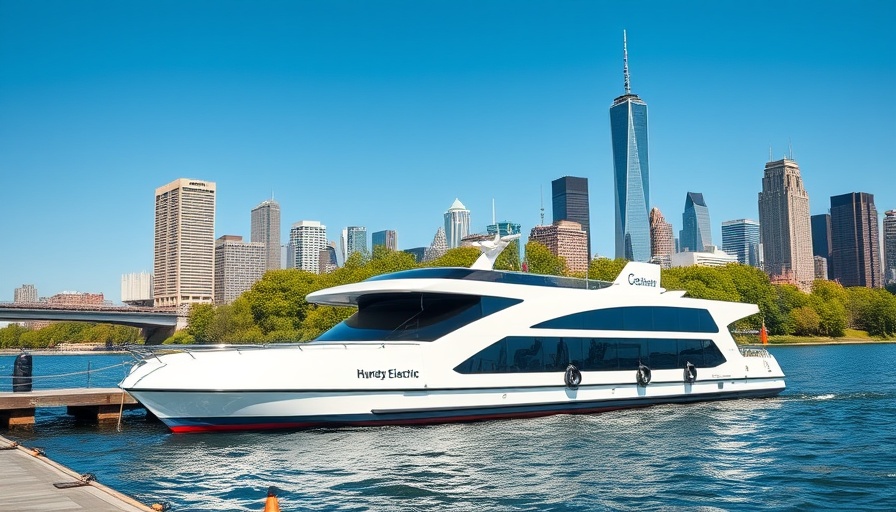
Welcome to the Future of Ferry Transportation
This November, attendees at the Marine Log's FERRIES 2025 conference will have a chance to witness a groundbreaking advancement in maritime transportation: New York's first hybrid-electric public ferry, the Harbor Charger. Set to depart from Jersey City’s Hyatt Regency on November 5, the tour promises to leave an indelible mark on the future of sustainable ferries, enhancing both experience and efficiency as they cross the New York Harbor.
Milestones in Sustainable Transport
The Harbor Charger, costing a cool $33 million, embodies a pivotal shift from traditional transport methods. With a capacity to carry 1,200 passengers and 30 vehicles, this cutting-edge vessel is not just a new mode of transport but serves as a symbol of New York's commitment to sustainable practices. Over its predecessor, the 1956 diesel-powered ferry, the Harbor Charger boasts a renewed design aimed at serving nearly one million annual visitors to Governors Island—an oasis for climate research just steps away from the chaotic Lower Manhattan.
Pioneering Technologies and Environmental Impact
The innovative features of the Harbor Charger stem chiefly from its Siemens Energy-engineered BlueDrive Eco propulsion system, allowing it to operate in either fully electric mode or as a hybrid vessel. This flexibility is crucial for reducing the ferry's environmental footprint. In fact, it is projected to cut carbon dioxide emissions by an impressive 600 tons yearly while offering service that is up to 66% faster compared to the aging ferry it replaces.
“Delivering the Harbor Charger to New York Harbor is a proud moment for all of us at Conrad,” said Johnny Conrad, executive chairman of Conrad Shipyard. The combination of traditional craftsmanship and modern technology illustrates how industries can align with eco-friendly goals. With ADA accessibility and modern amenities, the Harbor Charger is set to provide a comprehensive user experience that aligns with the needs of today's environmentally conscious passengers.
Rising Tide of Hybrid Ferries
This development comes amidst a broader trend in ferry transport, where hybrid-electric models are beginning to replace aging diesel warriors. The Harbor Charger joins a select cadre of hybrid ferries, with similar vessels beginning to pop up across the country. According to reports, Washington State Ferries recently revitalized their Wenatchee ferry with a hybrid system, demonstrating that the wave of sustainability is shaping maritime transportation nationwide.
While many ferry operators still rely on outdated diesel engines, innovations like the Harbor Charger present a compelling case for modernization. In an age where climate change awareness is paramount, the implementation of hybrid vessels could become the norm rather than the exception.
Challenges on the Horizon
Despite this advancement, challenges lie ahead. Underfunding for renewable transport initiatives continues to be a concern. Recently, federal funding programs that aimed to electrify ferry transport faced setbacks under new legislation. This puts additional pressure on local governments to secure budgets for infrastructure development, such as the shoreside charging stations necessary for fully operational hybrid-electric vessels.
Yet, optimism remains high within the community. “The Harbor Charger is a critical example of what the future can be and will be,” stated U.S. Rep. Dan Goldman, reflecting a shared sentiment among many who see this vessel as a harbinger of greater things to come.
Secure Your Spot at FERRIES 2025
As we approach the FERRIES 2025 conference, enthusiasts, operators, and policymakers alike have an opportunity to be part of a transformative era in maritime transportation. Spots for the Harbor Charger tour are limited and available exclusively to registered attendees. With its modern designs and robust features, the Harbor Charger delivers a beautiful marriage of utility and sustainability, marking not just a ferry but a movement towards cleaner transport solutions for the future.
Join us in celebrating and witnessing the dawn of eco-friendly ferry transport by registering for the FERRIES 2025 Conference today.
 Add Row
Add Row  Add
Add 




Write A Comment